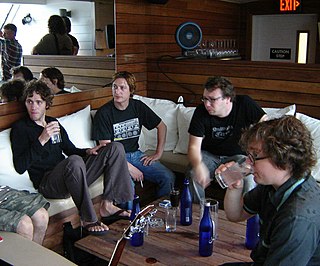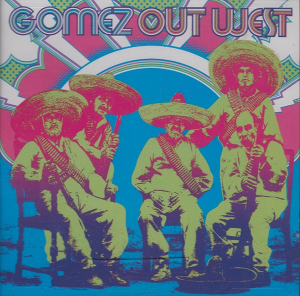
Gomez are an English indie rock band from Southport, Merseyside, comprising Ian Ball, Paul "Blackie" Blackburn (bass), Tom Gray, Ben Ottewell and Olly Peacock. The band has three singers and four songwriters, employing traditional and electronic instruments. Their music covers the genres of blues, indie, alternative, rock, folk, psychedelic and experimental.

The Remote Part is the third studio album by Scottish rock band Idlewild, released on 15 July 2002 by Parlophone. As they were becoming increasingly aware of their label's interest in them and their demos, the band's musical direction was being steered by guitarist Rod Jones. For the first half of 2001, the band recorded songs with producers Stephen Street and Lenny Kaye. Due to the uneven nature of the songs done between tours, they spent some time reworking 20 tracks in the Scottish Highlands. They recorded at Rockfield Studios in Wales, RAK Studios in London, and Sawmills Studios in Cornwall with producer Dave Eringa. Described as an alternative rock and indie rock record, it lacked the punk rock elements of their previous work.

In Our Gun is the third studio album by English rock band Gomez, released on 18 March 2002 by Hut Records.

Bring It On is the debut album by English indie rock band Gomez, released on 13 April 1998 by Hut Records. Recording sessions for the album began in late 1997, during which time Gomez also toured the United Kingdom with Embrace. The first single, "78 Stone Wobble", was released in March 1998, while "Get Myself Arrested" and "Whippin' Piccadilly" were later released as singles.

Static Prevails is the second studio album by American rock band Jimmy Eat World, released on July 23, 1996, through Capitol Records. Following the release of the band's self-titled debut album (1994), they signed to Capitol in mid-1995 for further releases. Carrier member Rick Burch replaced bassist Mitch Porter, who left to become a Mormon missionary. Recorded at Sound City in Los Angeles, California, and at Big Fish, in Encinitas, California, Wes Kidd, Mark Trombino, and Jimmy Eat World acted as producers for the album.

Drawn from Memory is the second album by English rock band Embrace, released on 27 March 2000 by Mobetta, Hut, and Virgin Records. Following the release of their debut studio album The Good Will Out (1998), touring keyboardist Mickey Dale became an official member. Frontman Danny McNamara began suffering from writer's block, leaving guitarist Richard McNamara to handle the writing. Sessions were done at Batsford Park Manor in Gloucestershire, Olympic Studios in London, and Soundworks Studios in Leeds. Tristin Norwell and the band producer the entire album, bar "You're Not Alone", which was produced by Hugo Nicolson. Songs on the album centred around the arrangements and the interplay between instruments, instead of being melody-driven.

"Babylon" is a song by British singer-songwriter David Gray. Originally released on 12 July 1999 as the second single from his fourth album, White Ladder (1998), it was re-released as the album's fourth single on 19 June 2000. Described as Gray's signature song, "Babylon" is "about a love that is lost and found again".

"A Song for the Lovers" is a song by English singer-songwriter Richard Ashcroft, included as the opening track on his 2000 album, Alone with Everybody, as well as his first solo single following the break-up of the Verve. The song was released on 3 April 2000 as the first single from the album in the United Kingdom and Australia. "A Song for the Lovers" was originally written by Richard Ashcroft as a demo track for the Verve's studio album Urban Hymns; three different versions were recorded, but the song did not make the final cut. It was inspired by Joy Division's "Love Will Tear Us Apart".

"Bring It All Back" is the debut single of British pop group S Club 7. It was co-written by S Club 7, Eliot Kennedy, Mike Percy and Tim Lever for the group's debut studio album S Club (1999). Kennedy, Percy, and Lever also produced the song. It was released on 7 June 1999 as the album's lead single. "Bring It All Back" was used as the theme for the band's first CBBC series Miami 7 as well.

"I Try" is a song co-written and performed by American musician Macy Gray. Issued as the second single from her debut album, On How Life Is (1999), the song was first released in Japan as a double A-side with "Do Something" on July 23, 1999. Two months later, on September 27, "I Try" was released officially in the United Kingdom, where it topped the UK Hip Hop/R&B Singles chart and peaked at No. 6 on the main UK Singles chart. Globally, the song would be Gray's most successful single, peaking at No. 5 in the United States and Norway, No. 4 in Scotland, No. 3 in Austria, No. 2 in Canada, and No. 1 in Australia, Ireland and New Zealand. At the 2001 Grammy Awards, "I Try" won Best Female Pop Vocal Performance, and was nominated for Record of the Year and Song of the Year.

Out West (Live at the Fillmore) is a live double album released by Gomez in June 2005 and the first album the band released for ATO Records. It features material mostly from their first two albums, Bring It On and Liquid Skin, with a few tracks each from In Our Gun and Split the Difference, and one from the Machismo E.P.. There are also a few cover songs, such as "Going Out West" by Tom Waits and "Black Eyed Dog" by Nick Drake (which is combined with "Free to Run" in an extended song).

Five Men in a Hut is a 2006 compilation album by the British band Gomez. It covers their output from 1998 to 2004 when they were with Virgin Records.

Five Men In A Hut (DVD) is a DVD release by the British band Gomez, as a companion to the Five Men in a Hut B-sides compilation. It features videos for many of the band's songs, along with some interviews with the band members and some live performances.

Detroit Swing 66/Ping One Down is a seven-track EP by British rock band Gomez, released in 2002 on Hut/Virgin Records in Australia. Both Detroit Swing 66 and Ping One Down had been featured on the album In Our Gun. Detroit Swing 66 was played to radio in Australia only. However, Ping One Down had a video made and was released as another double A side single in the UK, together with Sound of Sounds. Consequently, Sound of Sounds never aired in Australia. The EP’s B-sides are mostly from the UK Gomez single Shot Shot, apart from Click Click, which had been featured on the UK Ping One Down/Sound of Sounds single. The five extra tracks were later that year put onto a bonus disc to be repackaged with In Our Gun.

"Every You Every Me" is a song by British alternative rock band Placebo, released as the third single from their second album, Without You I'm Nothing, on 25 January 1999. It was released as a 2-CD set and on cassette, but promotional copies on 12-inch vinyl exist. The single managed to chart at number 46 in Australia, number 99 in Germany, and number 11 on the UK Singles Chart. There are two versions of the video, both filmed live at London's Brixton Academy; one includes clips from the film Cruel Intentions. An alternative video taking place at a casino was filmed in November 1998 but would not be released until 18 years later as part of the promotion for A Place for Us to Dream.

Benjamin Joseph Ottewell is an English singer-songwriter. He is one of the three lead singers of the English indie rock band Gomez. He was the recipient of the Mercury Music Award Prize in 1998, and is well known for his "deep, raspy voice" and "gravelly baritone". In 2011, Ottewell embarked upon a solo-project, with the debut album Shapes & Shadows.

A New Tide is the sixth studio album by the English indie rock band Gomez released on 30 March 2009 by ATO Records. The album was produced by the band as well as Brian Deck and received average reviews from music critics.

Chad I Ginsburg, also credited as CiG, is an American musician. He is the guitarist, producer and current vocalist of West Chester-based rock band CKY, which he co-founded in 1998. Prior to CKY, Ginsburg performed in the rock band Rudy & Blitz, and in July 2015, released his debut solo album Rock n Roll Alibis.
"Alice" is a song by American singer Lady Gaga recorded for her sixth studio album, Chromatica (2020). It appears as the album's second track, preceded by a string arrangement titled "Chromatica I". It was written by Lady Gaga, BloodPop, Axwell, Justin Tranter, and Johannes Klahr, and produced by BloodPop, Axwell, and Klahr. The song references Lewis Carroll's 1865 children's novel Alice's Adventures in Wonderland.


















